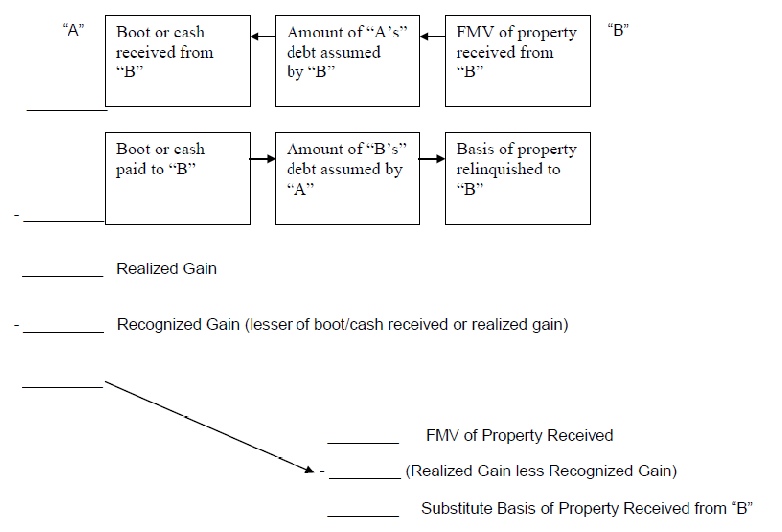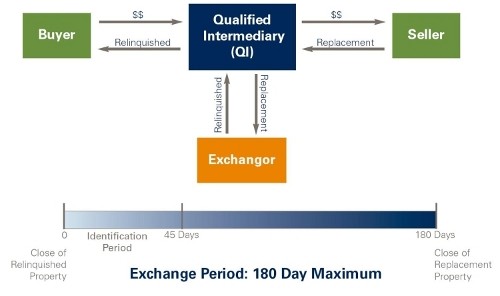Like Kind Exchange
Post on: 16 Март, 2015 No Comment

Like Kind Property for 1031 Exchanges: Are Your Assets Like Kind?
Relinquished properties and like-kind replacement properties that are part of a single like-kind exchange transaction must qualify as like-kind property to each other in order to qualify for tax-deferred like-kind exchange treatment under Section 1031 of the Internal Revenue Code (like-kind exchange).
Unfortunately, there is still a lot of confusing, misleading and inaccurate educational material and technical information circulating throughout the Internet today regarding the types of properties or assets that will qualify as like-kind exchange replacement properties in order to complete a successful like-kind exchange transaction, especially when there is personal property involved in the like-kind exchange.
This article is designed to help you break down and better understand the like-kind exchange property issues and requirements into an easy to understand format. You are always welcome to contact one of our like-kind exchange experts or to post your like-kind exchange questions on the Exeter Discussion Board in order to get answers or clarify issues that you may have. Exeter is always available to assist you with the planning of your like-kind exchange.
Like Kind Exchange Qualified Use Property
We must first determine whether your relinquished properties and your like-kind replacement properties are qualified use properties. Read our web page entitled Qualified Use Properties: Do Your Assets Qualify for Like Kind Exchange Treatment in order to determine whether your properties are qualified use properties. Once you have determined that all of your properties are qualified use properties we can then move on to determine whether your properties are like-kind to each other and would qualify for like-kind exchange treatment.
Like-Kind Real Property
Determining whether your investment properties are like kind to each other is easy once you have determined whether they are qualified use properties. As long as your relinquished properties and your like-kind replacement properties are qualified use properties as described above any kind of real estate will be considered to be like-kind to any other kind of real estate. In other words any kind of real estate is like kind to each other as long as they are held for rental, investment or use in a trade or business.
Like-Kind and Non-Like-Kind Replacement Properties
Like-Kind Real Property
The following list of real property asset classes represents interests in real property that usually qualify as like-kind property for 1031 Like-Kind Exchange purposes:
- Single Family Residential Property
- Multi-Family Property (Apartments)
- Commercial Office Properties
- Retail Shopping Properties
- Industrial Warehouse Properties
- Triple Net Lease (Net Lease or NNN) Investment Properties
- Agricultural (Farm) Properties
- Vacant Undeveloped Land
- Oil & Gas Interests
- Mineral Rights
- Water Rights
- Air Rights
- Easements in perpetuity
- Leases with a remaining life, including options, of 30 years or more
- Tenant-In-Common TIC Investment Property Interests
- Delaware Statutory Trusts DSTs Investment Property Interests
- Vacation rental properties (income producing)

Special Rules for Vacation Properties and Second Homes
There are new requirements for a like-kind exchange of property held or used as your second home or vacation property. The Internal Revenue Service issues Revenue Procedure 2008-16 that addresses these type of like-kind exchange transactions. Read our web page entitled 1031 Exchange of Vacation Property or Second Home Does Qualify .
Non-Like-Kind Real Property
Certain types of properties are specifically excluded and are not considered to be like-kind real property for like-kind exchange treatment pursuant to Section 1.1031 of the Department of the Treasury Regulations. These excluded real properties are listed below and include those held for personal use, property held for sale (inventory), securities or security interests, and interests in an entity such as an equity ownership position in a partnership, limited partnership or corporation.
Personal Use Assets
- Primary residence
- Second home Vacation home (personal use)
Property Held For Sale
- Property acquired for development and then sale Property acquired for conversion and then sale (condo conversions) Property acquired to fix-up and sell (rehab and then flip) Property held for sale
Securities
- Cash Stocks Bonds Mutual funds Real Estate Investment Trusts (REITs) (except via an upREIT)
Ownership Interest in an Entity
- Partnership interests owned in a general or limited partnership Membership interests held in a limited liability company (unless it is a single member LLC) Shares of stock owned in a C or S corporation
Like Kind Exchange of Personal Property
In addition to real property, personal property may also qualify for like-kind exchange treatment if the qualified use property requirements and like-kind replacement property tests are met. You must exchange personal property for like-kind personal property. You cannot exchange personal property for real property because personal property is not like-kind to real property. State law generally determines whether property is classified as real or personal property for like-kind exchange treatment. It is important to note that the definition of like-kind is much more restrictive and much more narrowly defined for personal property than the like-kind property standard applied to real property.
Like Kind Exchange of Domestic Property versus Foreign Property
Real or personal property sold in one state may be exchanged for property located in another state provided both properties are located and/or used within the United States of America (i.e. they are all considered domestic properties). You can only exchange domestic (U.S.) real or personal property for domestic replacement property, or you can exchange non-domestic (foreign) real or personal property for non-domestic (foreign) property. Domestic property can not be exchanged for non-domestic property because they are not considered to be like-kind property to each other.
For example, a United States citizen can sell an investment real property in Canada and 1031 Exchange it for a replacement property located in Canada or the United Kingdom (U.K.) or Australia or Mexico or any other foreign country. Similarly, a Mexican National that owns investment property in the United States can sell and 1031 Exchange the investment property located in the United States for replacement investment property located in the United States. Certain state and/or local exceptions may apply, so consult with your legal and/or tax advisor.
Like Kind Exchange of United States Territories and Possessions
Property located or used within U.S. territories or U.S. possessions may or may not qualify for like-kind exchange treatment for property located or used within the United States.
Temporary Regulations issued in 2005 (T.D. 9194) permitted exchanges, under certain circumstances, of real or personal property located or used within the United States with real or personal property located or used within the U.S. Virgin Islands, Guam and the Northern Mariana Islands.
Personal property is classified as United States property or foreign property based on the territory that it is predominantly used in for the two (2) years prior to the sale of the relinquished property and the two (2) years after the acquisition of the like kind replacement property.
back to top














